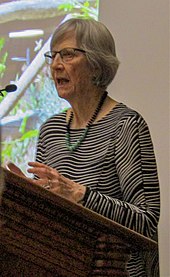Laurel Thatcher Ulrich
historiadora estadounidense
| Laurel Thatcher Ulrich | |||||||||||
|---|---|---|---|---|---|---|---|---|---|---|---|
 «Las mujeres que se comportan bien rara vez hacen historia». |
|||||||||||
| Véase también | |||||||||||
| Esta página contiene citas de una persona actualmente viva. | |||||||||||
| Dependiendo de cómo se publicaran, pueden estar protegidas por derechos de autor. Deben usarse según las políticas de licencias de Wikiquote. | |||||||||||
Laurel Thatcher Ulrich (Sugar City, Idaho, 11 de julio de 1938) es una historiadora estadounidense.
Citas
editar- «Las mujeres que se comportan bien rara vez hacen historia».
[Well-behaved women seldom make history].[1]
- «Para ser feliz con un hombre hay que entenderlo mucho y amarlo un poco. Para ser feliz con una mujer hay que quererla mucho y no intentar comprenderla en absoluto».
[To be happy with a man you must understand him a lot and love him a little. To be happy with a woman you must love her a lot and not try to understand her at all].[2]
- «Una pionera no es alguien que hace su propio jabón. Es alguien que toma su carga y camina hacia el futuro».
[A pioneer is not someone who makes her own soap. She is one who takes up her burdens and walks toward the future].[3]
Digresiones y tesis
editar- «Algo al hacer historia es intencional; gran parte es accidental. La gente hace historia cuando escala una montaña, enciende una bomba o se niega a trasladarse a la parte trasera del autobús. Pero también hacen historia al llevar diarios, escribir cartas o bordar iniciales en sábanas de lino. La historia es una conversación y, a veces, una coincidencia a gritos entre el presente y el pasado, aunque a menudo las voces que más queremos escuchar son apenas audibles. La gente hace historia al transmitir chismes, guardar registros antiguos y nombrar ríos, montañas y niños. Algunas personas dejan solo sus huesos, aunque los huesos también hacen historia cuando alguien se da cuenta».
[Some history-making is intentional; much of it is accidental. People make history when they scale a mountain, ignite a bomb, or refuse to move to the back of the bus. But they also make history by keeping diaries, writing letters, or embroidering initials on linen sheets. History is a conversation and sometimes a shouting match between present and past, though often the voices we most want to hear are barely audible. People make history by passing on gossip, saving old records, and by naming rivers, mountains, and children. Some people leave only their bones, though bones too make a history when someone notices].[4]
Referencias
editar- ↑ "Virtuous Women Found". American Quarterly, en el Oxford Essential Quotations,1976, vol. 28, 6.ª ed. Oxford University Press, 2018. ISBN 9780191866692.
- ↑ Weekly World News. 18.07.2000. p. 33Vol. 21,N.º 43. ISSN 0199-574X.
- ↑ Weber Studies, Volumen 10, p. 40. Colaborador Weber State College. School of Arts and Humanities 1993.
- ↑ Ulrich, Laurel Thatcher. Well-Behaved Women Seldom Make History, p. XXXIII. Knopf Doubleday Publishing Group, 2008. ISBN 9780307472779.